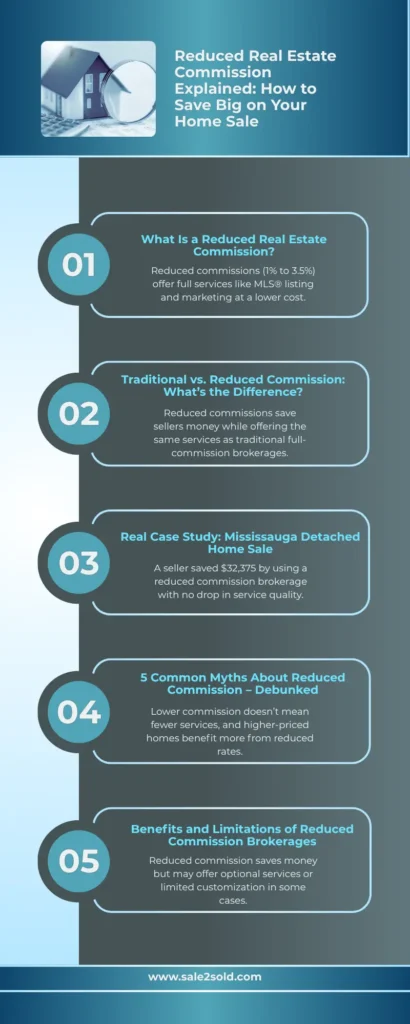Reduced Real Estate Commission in Canada 2025

Table of Contents
Toggle
Traditionally, real estate commissions have been set at 5 to 6%, with the seller typically paying the commission for both the listing and buyer’s agent. This system has long been the norm, but recent changes in the U.S. have sparked a new conversation about the fairness of such fees. In late 2023, a landmark lawsuit filed in the U.S. accused real estate associations of inflating commission rates, leading to an agreement that could significantly lower these rates in the future. While the verdict is still being contested, the case has set a precedent, one that could ripple across the border and influence the Canadian real estate market, further promoting the move toward Reduced Real Estate Commission.
In Canada, legal challenges are already underway, with a class action lawsuit being brought against several real estate boards, including the Canadian Real Estate Association (CREA) and the Toronto Regional Real Estate Board (TRREB). The lawsuit argues that the system of offering buyer’s agents a fixed commission via MLS listings is anti competitive, leading to inflated costs for sellers. The outcome of this case could reshape the way commissions are structured in Canada, particularly if courts decide to follow the lead of the U.S. legal landscape and lean in favor of Reduced Real Estate Commission practices.
Reduced Real Estate Commission refers to agents who charge lower fees than the traditional 5 to 6%. For instance, some agents may offer their services for as little as 2 to 3%, with the idea of saving homeowners money while still providing a full range of real estate services. These lower fees are achieved by streamlining operations, leveraging technology, and providing focused, efficient service.
Agents who promote Reduced Real Estate Commission often make use of online platforms to manage listings, handle paperwork, and market properties efficiently. The use of digital marketing tools, for instance, reduces the need for expensive traditional marketing methods, such as print ads and large open house events. By adopting such technologies, reduced commission realtors are able to pass the savings onto their clients while maintaining the high level of service expected from real estate professionals.
For homeowners, this can be a game changer. Rather than paying 5 to 6% in commission fees, they may only need to pay 2 to 3%. This reduction can mean saving thousands of dollars on the sale of a home money that could go toward a new home purchase, renovations, or other personal expenses. Choosing a Reduced Real Estate Commission model makes smart financial sense, especially in a high priced market.
The push for Reduced Real Estate Commission fees is a direct response to the increasing cost of homeownership in Canada. As property prices rise, so too do the associated costs, including commissions. For many buyers and sellers, the idea of paying a significant portion of their transaction as a fee to real estate agents no longer seems reasonable. In this environment, reduced commission models offer a way to make real estate transactions more affordable without sacrificing service quality.
One of the key benefits of Reduced Real Estate Commission is the increased competition it fosters among real estate agents. When agents know that clients are shopping for the best deal, they are motivated to offer competitive rates and better service. This not only benefits consumers but also encourages real estate professionals to innovate and provide more value in their offerings. For example, agents may bundle services such as professional photography, home staging advice, or virtual tours to make their reduced fee packages more appealing.
However, there are challenges to the widespread adoption of Reduced Real Estate Commission models. Some professionals worry that lower commissions will result in reduced income, particularly for top producing agents who rely on the traditional model. Others believe that a lower fee may lead clients to undervalue the work involved in a real estate transaction.
In both the U.S. and Canada, real estate commissions are being scrutinized in courtrooms. In the U.S., the National Association of Realtors (NAR) agreed to a landmark settlement in a class action lawsuit that accused the organization of price fixing commission rates. As part of the settlement, NAR agreed to no longer require sellers to offer commission payments to buyer’s agents on the Multiple Listing Service (MLS). This is a significant shift in a market where such payments have long been standard practice and it aligns closely with the goals of Reduced Real Estate Commission advocates.
In Canada, a similar class action lawsuit has been filed, seeking to address what is perceived as anti competitive practices related to commission structures. The lawsuit argues that the current system where buyers’ agents are paid by the seller results in inflated commissions and less competition in the market. The plaintiffs hope that a favorable court ruling could lead to lower commission rates and a more competitive environment for both buyers and sellers a true win for the Reduced Real Estate Commission movement.
While these lawsuits are still in the early stages, they represent a growing awareness of the need for transparency and fairness in the real estate industry. If Canadian courts follow the lead of their U.S. counterparts, we could see significant changes to the commission structure in the coming years.
In recent years, there has been a noticeable shift in consumer expectations. With the rise of online platforms and increased access to information, many buyers and sellers are no longer willing to accept high commission rates without questioning them. This has led to greater interest in Reduced Real Estate Commission agents, who are able to offer similar services at a fraction of the traditional cost.
For agents, this presents both an opportunity and a challenge. On the one hand, Reduced Real Estate Commission models can attract more clients who are seeking to save money. On the other hand, it may require agents to adapt their business models and work more efficiently in order to maintain profitability. As a result, many agents are beginning to embrace technology, utilizing tools such as virtual tours, automated document management, and online marketing platforms to reduce costs and increase efficiency.
For consumers, the rise of Reduced Real Estate Commission agents represents an opportunity to take control of their real estate transactions and save money in the process. Whether buying or selling, consumers now have more options than ever before and can select an agent that aligns with their budget and service expectations.
As we move closer to 2025, it’s clear that the Canadian real estate market is on the cusp of significant change. Whether through legal challenges, market pressure, or consumer demand, the traditional commission structure may soon be a thing of the past, replaced by the growing popularity of Reduced Real Estate Commission alternatives.
In the most likely scenario, we could see a gradual decrease in commission rates, as both sellers and buyers demand lower fees. At the same time, increased competition among agents could lead to more creative and innovative approaches to real estate services, such as service bundling or tiered pricing models. Agents may also need to invest more in technology and automation to remain competitive and profitable.
One thing is certain: the real estate market in Canada is evolving, and both consumers and agents must be prepared for the changes that lie ahead. By staying informed and proactive, homeowners and real estate professionals can ensure that they are positioned to navigate this new landscape successfully.
The push for Reduced Real Estate Commission in Canada is not only a response to rising homeownership costs but also a reflection of the growing demand for transparency and value in real estate services. As legal challenges continue to unfold, there is a real possibility that commission rates will decline, leading to increased competition and more affordable options for consumers.
For those buying or selling a home in the coming years, understanding the evolving commission landscape will be essential. By exploring Reduced Real Estate Commission options, negotiating terms, and embracing new service models, homeowners can make smarter financial decisions and achieve their real estate goals while saving money.